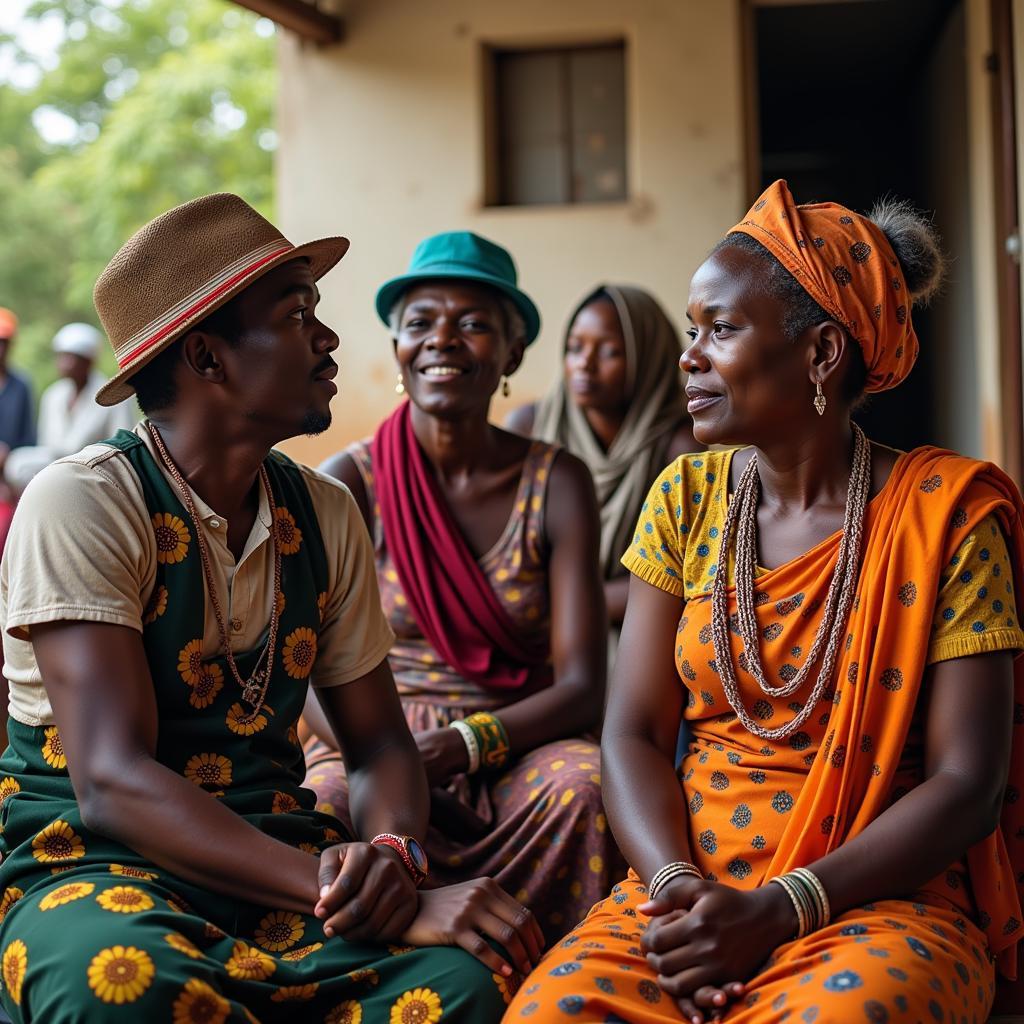Exploring the Vibrant World of African Tribal Dress
African Tribal Dress is more than just clothing; it’s a vibrant tapestry woven with history, tradition, and cultural identity. From the intricate beadwork of the Maasai to the colorful kente cloth of Ghana, each garment tells a story, reflecting the unique customs and beliefs of its people. This exploration delves into the rich symbolism and diverse expressions of African tribal dress, showcasing its enduring power in a globalized world. After reading this article you’ll appreciate the artistry and significance of these remarkable garments. For beautiful African inspired attire, consider these african inspired dresses sale.
The Significance of Color and Pattern in African Tribal Dress
Color plays a vital role in African tribal dress, often carrying deep symbolic meaning. Red, for example, can represent power, courage, or spiritual energy, while white might symbolize purity, peace, or the ancestors. Similarly, patterns and motifs are not merely decorative; they often convey messages about social status, clan affiliation, or even personal achievements. The intricate designs found in many African textiles are a testament to the creativity and skill of the artisans who create them. Think of the bold stripes of the Ndebele or the geometric patterns of the Kuba cloth, each telling a silent story of heritage and belonging. These visual narratives offer a glimpse into the complex social structures and belief systems that shape African communities.
Materials and Techniques: A Legacy of Craftsmanship
The materials used in African tribal dress are as diverse as the continent itself. From animal hides and natural fibers to handwoven textiles and imported fabrics, each material contributes to the unique character of the garment. Traditional techniques like weaving, dyeing, beading, and embroidery are passed down through generations, preserving a rich legacy of craftsmanship. These skills, honed over centuries, transform simple materials into works of art. Imagine the delicate beadwork of the Himba women or the intricate weaving of the Asante kente cloth, each a testament to the dedication and artistry of African artisans.
From Everyday Wear to Ceremonial Garb: The Diverse Functions of African Tribal Dress
African tribal dress encompasses a wide spectrum of garments, from everyday wear to elaborate ceremonial costumes. While some garments are worn for practical purposes, others are reserved for special occasions like weddings, funerals, or initiation ceremonies. The specific attire worn reflects the importance of the event and the individual’s role within the community. For instance, a young Maasai warrior’s attire differs significantly from that of an elder, reflecting their different stages of life and responsibilities.
African Tribal Dress in the Modern World: Preserving Tradition and Embracing Change
In today’s globalized world, African tribal dress continues to evolve, adapting to modern influences while retaining its cultural significance. While some communities maintain traditional dress practices, others incorporate contemporary elements, creating hybrid styles that reflect both their heritage and their engagement with the modern world. This dynamic interplay between tradition and innovation ensures that African tribal dress remains a vibrant and evolving expression of cultural identity. The world of African tribal fashion is a complex and fascinating one, encompassing not just clothing but an entire system of non-verbal communication and cultural expression. Did you know about the unique face piggy bank designs inspired by African culture? Check out this african face piggy bank.
Dr. Anika Moti, a renowned anthropologist specializing in African cultures, notes, “African tribal dress is a living testament to the resilience and creativity of African communities. It’s a powerful symbol of identity that connects people to their past while embracing the future.”
The Impact of Globalization and Tourism on African Tribal Dress
Globalization and tourism have undeniably impacted African tribal dress, both positively and negatively. While increased exposure has brought greater appreciation and economic opportunities for some communities, it has also led to the commodification and sometimes misrepresentation of cultural traditions. Balancing the preservation of cultural heritage with the demands of a globalized market remains a complex challenge.
Conclusion: A Celebration of Cultural Identity
African tribal dress is a powerful expression of cultural identity, reflecting the rich history, traditions, and artistry of African communities. From the vibrant colors and intricate patterns to the diverse materials and techniques, each garment tells a story, connecting people to their heritage and their place in the world. By understanding the significance of African tribal dress, we can appreciate the profound role it plays in shaping individual and collective identities. Explore the vibrant world of African tribal dress and discover the stories it tells. You might also be interested in this african beauty serial.
FAQ
- What are some of the most common materials used in African tribal dress?
- How do different colors and patterns symbolize meaning in African tribal dress?
- What are the differences between everyday wear and ceremonial garb in African tribal dress?
- How has globalization impacted traditional dress practices in Africa?
- Where can I learn more about specific African tribal dress traditions?
- Are there ethical considerations to keep in mind when purchasing or wearing African tribal dress?
- How can I support the preservation of traditional African textile arts?
Common Situations and Questions:
- Situation: You are attending a cultural event and want to show respect by wearing African-inspired attire. Question: What are appropriate ways to incorporate elements of African tribal dress into my outfit without being culturally insensitive?
- Situation: You are traveling to Africa and want to purchase authentic tribal dress. Question: How can I ensure I am buying ethically sourced items and supporting local artisans?
Further Exploration:
- Explore other articles on our website about African art, music, and culture.
- Learn more about the history and traditions of specific African tribes.
Contact Us
When you need assistance, please contact us:
Phone: +255768904061
Email: kaka.mag@gmail.com
Address: Mbarali DC Mawindi, Kangaga, Tanzania
We have a 24/7 customer service team.

